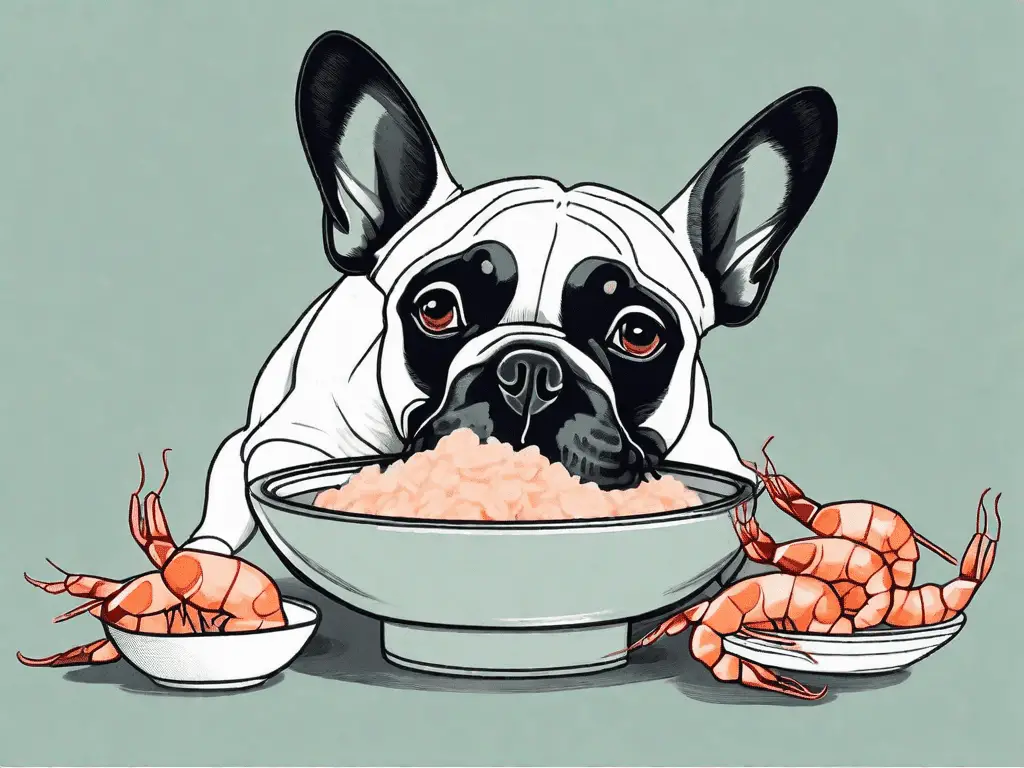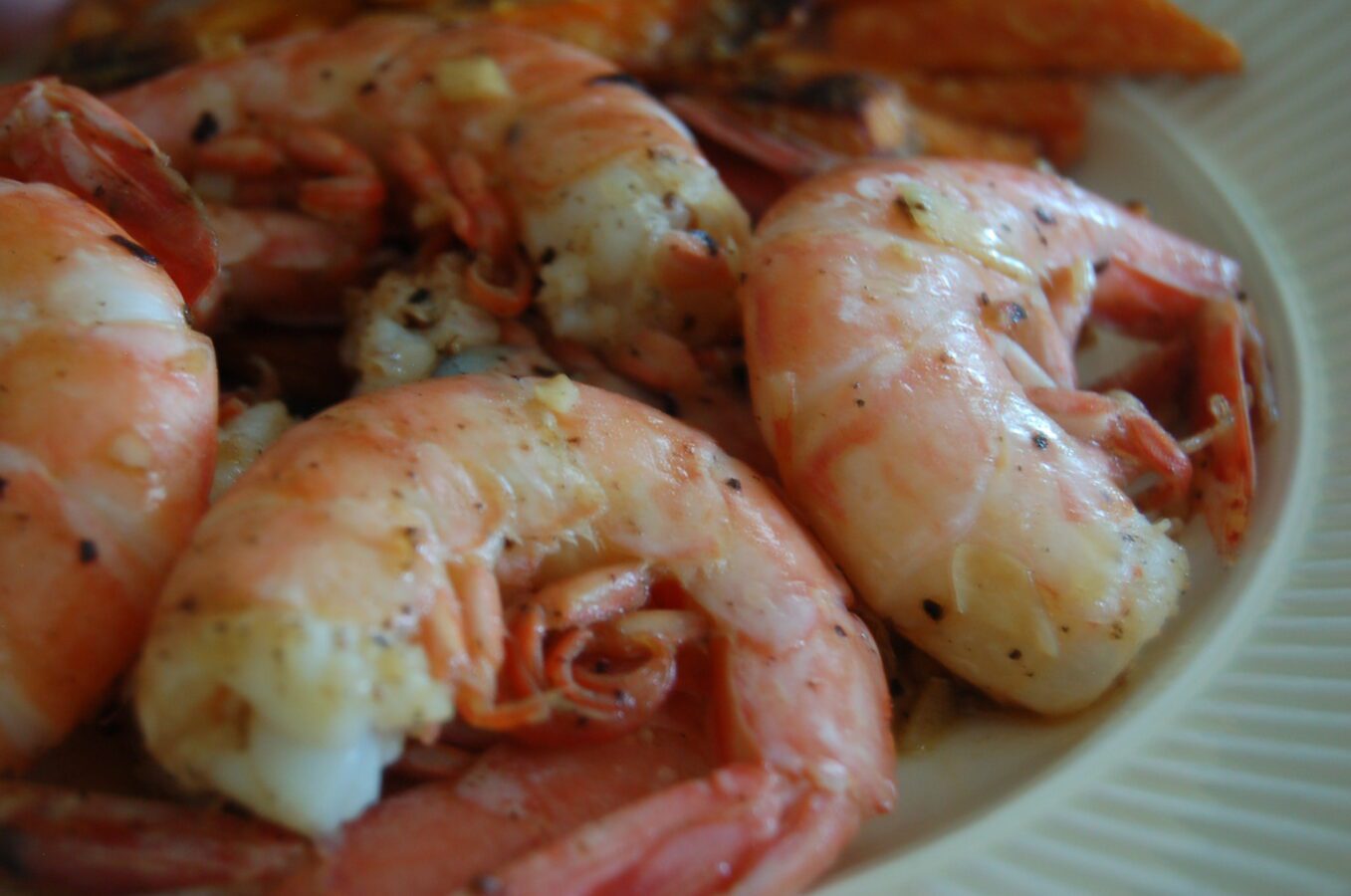French Bulldogs are a popular breed known for their charming personalities and unique appearances.
As a dog owner, it’s natural to want to provide them with a well-rounded and nutritious diet.
However, when it comes to certain foods like shrimp, it’s essential to understand the potential risks and benefits.
In this article, we will explore whether French Bulldogs can safely consume shrimp and delve into their dietary needs and alternatives.
Shrimp is not only safe but can also be nutritious for dogs, including French Bulldogs. It’s an excellent source of protein, B-vitamins, and phosphorus, which are beneficial for dogs’ health.
Can French Bulldogs Eat Shrimp
French Bulldogs can consume shrimp, but it should be cooked, shell-free, and served as an occasional treat due to its high cholesterol content.
Shrimp is a nutritious food for French Bulldogs when prepared properly. It’s recommended that the shrimp be cooked to eliminate potential bacteria such as salmonella and listeria.
Moreover, the shell should be removed before serving to prevent choking or digestive issues.
Shrimp is high in protein and contains beneficial nutrients like B-vitamins and phosphorus, which can boost gastrointestinal health.
However, due to its high cholesterol content, it should not make up a significant part of their diet and should be given sparingly as a treat.
While raw food diets are sometimes advocated for dogs, in the case of shrimp, it’s important to err on the side of caution and cook the seafood thoroughly before serving it to your French Bulldog.
Also, it’s always advisable to monitor your dog after introducing any new food into their diet to check for any adverse reactions.
Intestinal concerns when dogs eat shrimp
Shrimp consumption in dogs can lead to intestinal concerns such as blockage, choking hazards, and potential bacterial infections if not prepared properly.
Shrimp, while a good source of protein and vitamin B12, can pose risks for dogs if not served correctly. The shells and tails of shrimp are known to be a choking hazard and can even cause an intestinal blockage. Therefore, it is crucial to remove these parts before feeding shrimp to your dog.
Additionally, cooking the shrimp thoroughly is essential to eliminate any bacteria that could lead to gastrointestinal issues, including vomiting and diarrhea. Raw or undercooked shrimp has been associated with extreme cases of such problems.
Overfeeding shrimp to your dog can also result in gastrointestinal concerns like diarrhea, nausea, and vomiting.
Some dogs might even have allergies to shrimp, causing additional health issues. Therefore, while shrimp can be a part of your dog’s diet, it should be cooked, de-shelled, and served in moderation.
Can French Bulldogs Eat Raw Shrimp?

Feeding raw shrimp to French Bulldogs is not recommended due to the risk of bacterial infections like salmonella and listeria.
Raw shrimp carries the potential risk of containing harmful bacteria, including salmonella and listeria.
These bacteria can cause a range of health problems in dogs, from mild gastrointestinal upset to more serious conditions such as pancreatitis or kidney disease. Therefore, it’s crucial to cook shrimp thoroughly before feeding it to your French Bulldog.
Moreover, shrimp shells can be hard for dogs to digest and pose a choking hazard, so it’s advised to remove them before serving.
While raw diets for dogs have gained popularity, they should be approached with caution and under the guidance of a professional pet nutritionist or a trusted vet, especially when it comes to seafood like shrimp.
Understanding the French Bulldog’s Dietary Needs

Like all dogs, French Bulldogs have specific nutritional requirements that must be met for optimal health. Their diet should consist of high-quality proteins, carbohydrates, and fats.
These macronutrients provide the necessary energy for their daily activities and support their overall well-being. French Bulldogs are known for their muscular build, and a protein-rich diet is essential for maintaining and developing their muscles.
In addition to macronutrients, French Bulldogs also need essential vitamins and minerals to support their growth and overall health.
These micronutrients play a crucial role in maintaining their coat, as well as promoting healthy skin and a strong immune system.
Vitamins such as A, E, and C are important for their antioxidant properties, while minerals like calcium and phosphorus are necessary for strong bones and teeth.
Proper nutrition is not only important for physical health but also for mental well-being.
French Bulldogs are intelligent and active dogs, and a balanced diet can provide them with the necessary nutrients to support their cognitive function and energy levels.
It’s important to choose a dog food that is specifically formulated for French Bulldogs, taking into account their unique nutritional needs.
Is Phosphorus in Shrimp Harmful To French Bulldogs?

Phosphorus in shrimp is not harmful to French Bulldogs when consumed in moderation as it’s an essential mineral for dogs’ overall health.
Phosphorus is a key mineral that supports a variety of bodily functions in dogs, including the formation of bones and teeth, and the maintenance of kidney function and muscle contractions.
Shrimp is a good source of phosphorus and can contribute positively to a dog’s diet when fed appropriately.
However, just like any other food, shrimp should be given to French Bulldogs in moderation. While phosphorus itself is not harmful, overconsumption can upset the balance of calcium and phosphorus in the dog’s body, potentially leading to bone problems.
Therefore, it’s important to ensure that your French Bulldog’s diet is balanced and not excessively high in phosphorus.
Common Food Allergies in French Bulldogs

| Common Food Allergies in French Bulldogs | Symptoms |
|---|---|
| Chicken | Skin irritation, gastrointestinal upset, diarrhea, vomiting |
| Beef | Itchy skin, ear infections, chronic gas, loose stools |
| Dairy | Diarrhea, gas, vomiting, loss of appetite |
| Wheat | Skin rash, hair loss, itching, chronic ear infections |
| Soy | Gastrointestinal upset, skin irritation, excessive licking |
| Corn | Skin rashes, gastrointestinal issues, hives, swollen face |
| Eggs | Skin inflammation, gastrointestinal problems, weight loss |
| Fish | Skin irritation, vomiting, diarrhea, loss of appetite |
While French Bulldogs are generally not as prone to food allergies as some other breeds, they can still develop sensitivities or allergies to certain ingredients.
Grains, such as wheat, corn, and soy, are common allergens for dogs, including French Bulldogs.
Some dogs may experience digestive upset, skin irritations, or itching when consuming foods that contain these ingredients.
It’s important to carefully read the ingredient list of any dog food or treats you purchase for your French Bulldog to ensure they are free from these potential allergens.
Dairy products, including milk and cheese, are another common allergen for French Bulldogs. Many dogs are lactose intolerant and may experience digestive issues when consuming dairy.
If you suspect your French Bulldog has a dairy allergy, it’s best to avoid feeding them any products that contain milk or cheese.
Poultry, such as chicken or turkey, is also known to cause allergies in some French Bulldogs. Symptoms of poultry allergies may include itching, digestive upset, or skin irritations.
If you notice any signs of allergies after feeding your French Bulldog poultry-based foods, it’s best to consult with your veterinarian to determine the best course of action.
The Health Benefits and Risks of Shrimp

| Health Benefits of Shrimp | Potential Risks of Shrimp |
|---|---|
| High in Protein: Shrimp is a good source of lean protein, which is essential for building and repairing tissues. | Allergies: Some people are allergic to shellfish, including shrimp, which can cause severe reactions. |
| Rich in Antioxidants: Shrimp contains selenium and astaxanthin, both powerful antioxidants that help fight inflammation in the body. | High in Cholesterol: Shrimp is high in cholesterol, which, when consumed in excess, could lead to heart disease. |
| Provides Vitamin B12: This vitamin is crucial for nerve function and the production of DNA and red blood cells. | May Contain Toxins: Depending on where they’re harvested, some shrimp may be contaminated with harmful bacteria or toxins. |
| Good Source of Omega-3: Omega-3 fatty acids in shrimp promote heart and brain health. | Unsustainable Farming Practices: Some shrimp farming practices can be harmful to the environment. |
| Contains Phosphorus: Phosphorus aids in the formation of bones and teeth, and helps kidney function and muscle contractions. | Dietary Restrictions: People with certain dietary restrictions or health conditions may need to limit or avoid shrimp. |
French Bulldogs, like humans, can benefit from the nutritional content of shrimp.
This crustacean is packed with essential nutrients, including omega-3 fatty acids, which are known to promote healthy skin and a shiny coat for your furry friend says Rover.
Here is a full case study done by Science Direct on shrimp’s health benefits.
Nutritional Content of Shrimp
Shrimp is not only delicious but also a nutritional powerhouse. It contains high-quality protein, which is essential for muscle development and repair.
In addition to protein, shrimp is a good source of vitamins and minerals, including vitamin B12, selenium, and zinc. These nutrients play a vital role in various bodily functions, such as maintaining a healthy immune system and supporting proper brain function.
Furthermore, shrimp is low in saturated fat and cholesterol, making it a heart-healthy choice. Its omega-3 fatty acid content helps reduce inflammation in the body, which can lower the risk of heart disease and other chronic conditions.
Potential Hazards of Feeding Shrimp to Dogs
While shrimp offers numerous health benefits, it is essential to be aware of potential hazards associated with feeding it to dogs, including French Bulldogs.
One concern is the risk of bacterial contamination, especially if the shrimp is consumed raw or undercooked. To mitigate this risk, it is crucial to ensure that any shrimp given to your furry friend is properly cooked and free from any harmful bacteria.
Another consideration is the presence of shrimp shells. These shells can pose a choking hazard or irritate the delicate digestive system of French Bulldogs. It is crucial to remove the shells before feeding shrimp to your dog to prevent any potential harm.
Additionally, some dogs may develop allergies or sensitivities to shrimp. If your French Bulldog exhibits any signs of an allergic reaction, such as itching, vomiting, or diarrhea, it is best to consult with a veterinarian.
They can help determine if shrimp or any other specific food is causing the allergic response and provide guidance on appropriate dietary adjustments says PetMD.
Preparing Shrimp for Your French Bulldog
If you decide to incorporate shrimp into your French Bulldog’s diet, it’s crucial to take the necessary precautions.
First and foremost, ensure that the shrimp is thoroughly cooked to eliminate any potential bacteria. Raw or undercooked shrimp can contain harmful pathogens that may lead to digestive upset or even food poisoning in your furry companion.
Furthermore, it’s important to remove the shells and devein the shrimp before serving it to your French Bulldog.
Shrimp shells can pose a choking hazard and may cause discomfort during digestion. Deveining the shrimp helps eliminate the digestive tract, which can sometimes contain sand or other debris that might upset your dog’s stomach.
Additionally, it’s advisable to cut the shrimp into smaller, bite-sized pieces. This precaution minimizes the risk of choking or obstruction, especially for French Bulldogs who tend to gulp down their food quickly.
By cutting the shrimp into smaller portions, you can ensure that your furry friend can safely enjoy this seafood delicacy says AKC.
Alternatives to Shrimp in a French Bulldog’s Diet
If your French Bulldog cannot safely consume shrimp or has shown signs of allergies, there are plenty of other seafood options to consider.
Fish like salmon, tuna, and sardines are excellent alternatives. These fish provide similar nutritional benefits as shrimp and are often well-tolerated by dogs.
However, always ensure that the fish is cooked thoroughly and properly prepared before feeding it to your French Bulldog.
Non-Seafood Protein Sources for French Bulldogs
If seafood isn’t an option for your French Bulldog, there are several non-seafood protein sources available.
Lean meats such as chicken, turkey, or beef can provide the necessary protein for muscle development and energy.
Additionally, plant-based proteins like lentils, beans, or tofu can be included in their diet with guidance from a veterinarian says PetCo.
Consulting with a Vet about Your French Bulldog’s Diet
Every dog is unique, and their dietary needs may vary based on factors such as age, weight, and health conditions.
If you have any concerns or questions about your French Bulldog’s diet, it’s crucial to consult with a veterinarian.
They can provide tailored advice considering your dog’s specific needs and help create a balanced diet plan that promotes their overall health and well-being.
How Vets Can Help Tailor Your French Bulldog’s Diet
Veterinarians can offer valuable insights into the best diet for your French Bulldog.
They can assess their current health, evaluate their nutritional needs, and make personalized recommendations.
Whether it’s determining portion sizes, identifying suitable food options, or addressing specific dietary concerns, a veterinarian’s expertise can be a valuable resource to optimize your French Bulldog’s diet says Daily Paws.
FAQs
Q: Is it safe for dogs to eat cooked shrimp?
A: Yes, it is generally safe for dogs to eat cooked shrimp. However, it should be given in moderation and without any seasonings or sauces that may be harmful to dogs.
Q: Why is shrimp bad for dogs?
A: While cooked shrimp is not inherently bad for dogs, it can be high in cholesterol, so it should be given in moderation, especially for dogs with certain health conditions.
Q: How many shrimp can you give your dog?
A: The amount of shrimp you can give your dog depends on its size and overall diet. It is best to consult with your veterinarian before introducing shrimp or any new food into your dog’s diet.
Q: Are there any specific health risks for dogs eating shrimp?
A: The main health risk of dogs eating shrimp is the potential for the high cholesterol content. Additionally, if the shrimp is not properly prepared or if your dog develops an allergic reaction, it can pose health risks.
Q: Can small dogs like French Bulldogs safely eat shrimp?
A: Yes, small dogs like French Bulldogs can safely eat shrimp, but always in moderation and ensuring that it is properly cooked and served without any additional seasonings or spices.
Q: Should I consult my vet before giving my dog shrimp?
A: Yes, it is always a good idea to consult with your veterinarian before adding shrimp or any new food to your dog’s diet, especially if your dog has any existing health issues or dietary restrictions.
Q: How should I prepare shrimp for my dog?
A: Shrimp should be thoroughly cooked, peeled, and deveined before giving it to your dog. It should be served in small, bite-sized pieces to prevent any choking hazards.
Q: Can shrimp be included in a dog’s regular diet?
A: Shrimp can be included in a dog’s regular diet as an occasional treat, but it should not replace their main diet. Moderation is key to ensure that the shrimp does not cause any digestive issues for your dog.
Conclusion and final thoughts
In conclusion, while shrimp can provide nutritional benefits, it’s important to consider the potential hazards and your French Bulldog’s specific dietary needs.
Always consult with a veterinarian before introducing any new food to ensure the safety and well-being of your beloved furry friend.
By providing a balanced and appropriate diet, you can help support their health and happiness throughout their life.





Leave a Reply